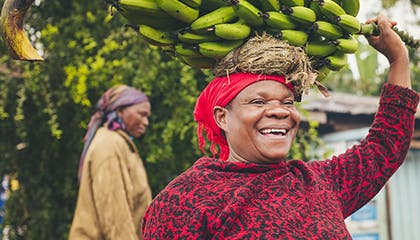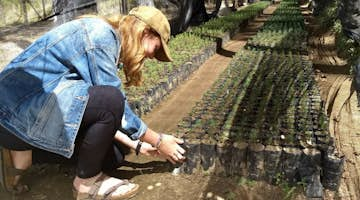
Sustainable Farming
Put your agricultural experience into practice and upskill African farmers by interning remotely with an agricultural training school on an operational farm in Tanzania. Help to teach locals modern and sustainable farming techniques, assist a lecturer to prepare lessons and workshops, or help to plan work.
What to expect from your Sustainable Farming internship:
- Intern with a leading agricultural institution and have an academically trained supervisor
- Combine theoretical teaching with practical tasks
- A broad range of farming activities including crop farming and livestock keeping
- Learn about tropical farming in East Africa and training methods for farmers
- Gain practical career experience from home without having to travel
Your internship abroad host organization:
- Agricultural training institute
Internship details
Put your agricultural experience into practice and upskill African farmers by interning remotely with an agricultural training school in Tanzania.
This is a remote internship you can conduct from home. Click here to view our Agriculture internships that you can do in-country, if you’d prefer to travel and intern abroad.
Agriculture is the backbone of Tanzania’s economy, with 80 percent of the population working in the industry. However, farming techniques are often out-dated, meaning harvests are vulnerable to extreme weather, and many farmers live off low incomes. This agricultural training institution contributes to the professionalization of farming in Tanzania by teaching secondary school graduates about modern farming methods.
As a remote agriculture intern, you’ll collaborate with local lecturers at an agricultural training school where around 500 students are taught sustainable farming on a working 1200-acre farm. The students assist hundreds of permanent and seasonal workers, learning effective farming methods for vegetables, grains, livestock, fruit and cash crops.
Virtual farming interns assist lecturers to prepare classes and activities for students, employing practical training so they can see the effect of their techniques. Interning remotely, you will help organize materials, understand seasonal priorities, help organize farm operations, and also teach students. Interns can help with the administrative side of the farm itself, planning seasonal work such as planting, fertilizing, harvesting, herding, pest control and productivity enhancements.
Your virtual internship in agriculture can also include assisting with the development and sale of agricultural products for local farmers. Interns can focus their efforts on the crops or farm products of their choosing, with a large number of options available. This is a highly rewarding internship in agriculture in which you’ll help to upskill local African farmers to maximize their efforts and income.
In all cases, interns should expect that the initial phase of their remote internship will focus on gaining some introductory knowledge. You may start by gaining an understanding or overview of what you can build upon, develop, learn, and contribute. Ensure that you ask questions and provide feedback during the introductory period, so that your supervisor understands how you’re progressing. This will help them to better understand important details, such as how quickly you learn, what you find challenging, what you find interesting, etc.
Understand and expect that individual internship experiences vary. Therefore, if you’re at a more introductory level, you should reasonably expect a more introductory internship. Likewise, if you’re interning for a shorter duration, you will have a different experience from someone who is interning for a longer duration. Placement preferences are considered but always subject to availability.
What are the career benefits of interning abroad as a Sustainable Farming Intern?
Sustainable Farming interns learn from a qualified and experienced supervisor, and can be involved in:
-
Preparing sustainable farming classes
-
Preparing educational resources for farming students
-
Organizing materials for seasonal tasks
-
Prioritising seasonal tasks and instructing staff
-
Introducing measures to improive productivity
-
Assisting with production of vegetables, grains, livestock, fruit and cash crops
Professional development opportunities:
-
Learn about modern large-scale farming methods in East Africa
-
Specialise in tropical crops farmed on alluvial soils and volcanic soils for domestic and export purposes, or specialise in livestock
-
Learn about agricultural education methods and training of farmers
-
Get experience organizing seasonal work
-
Gain practical skills and boost your employability, with guidance from RISEWAY’s Experiential Learning Curriculum to support your learning and cultural intelligence
Are you eligible for this internship?
Submit a free application so we can confirm your eligibility and check availability for your preferred dates.
Not sure which program to join?
What recent Sustainable Farming interns said about their experience
I enjoyed having a different cultural perceptions of agriculture. I also gained knowledge in the management and marketing aspect of agriculture which I was lacking. My supervisor was really devoted to help me thrive in the area that I did not explore in my courses. I loved how she was always available and give my the confidence to start my own agriculture experience with strawberry production in Côte d'Ivoire.
As an environmental science student, there is a wide range of job opportunities we can pursue. Therefore, this internship in sustainable farming helped me to narrow my choice and focus in this field, whether towards my master's degree or my future job in general. During my internship, I was involved with the research and policy department, operations department, and business department. My favorite outcome was being able to observe the CEO educating local Tanzanian farmers about agriculture and how to improve their production. I think passing on this knowledge and enriching the youth is a very important step towards achieving sustainable agriculture.
To read all reviews, visit our reviews page.

Academic credit available for all internships
Get course credit from your college or university while completing your internship abroad or a remote internship program. It's a great way to meet your academic requirements and gain valuable experience at the same time.
Learn about course creditProgram fees
It's free to apply for this internship. Once we have reviewed your suitability and accepted you onto this program, a deposit of US$499 is required to confirm your place. The remaining balance (minus your initial US$499 deposit) will be due within 7 days of being assigned a placement.
Duration |
Program Fee |
|---|---|
| 100 hours (3 weeks full time, or 5 weeks part time) | $1,099 |
| 250 hours (8 weeks full time, or 12 weeks part time) | $1,499 |
| 350 hours (13 weeks full time, or 17 weeks part time) | $1,799 |
- Dedicated support before, during, and after your internship
- Sourcing and securing your internship placement
- Personalization of your internship plan
- Orientation and coaching with your supervisor
- Documented portfolio of your experiential learnings
- Academic credit facilitation
- International reference letter
- Certificate of Internship Completion
- A deposit of $499 (approximately 499) is required to secure your internship
- Balance of your Program Fee is due 7 days before your internship start date. The Program Fee payment can also be completed in installments through our Zero-Fee Payment Plan. Learn more.
- All payments attract a 5% transaction fee to cover international banking fees and currency charges.
- International wire transfer payments attract a minimum fee of $75 USD.
- Terms and Conditions apply.








